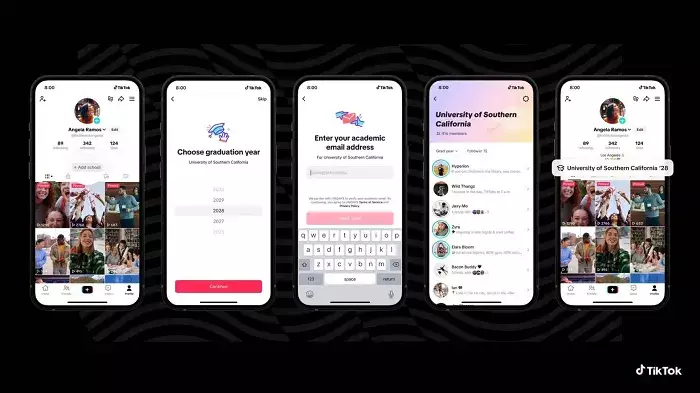In an era where digital platforms often masquerade as safe havens for genuine interaction, TikTok’s latest initiative—Campus Verification—appears to promise connectivity but secretly lays the groundwork for deeper vulnerabilities. The premise sounds appealing: helping students forge new friendships, easing the transition into college life with a seemingly harmless feature. Yet, beneath the surface, this initiative raises serious questions about privacy, safety, and the broader implications of commodifying student communities within a commercialized social media environment.
What TikTok is presenting as a tool for positive social integration is, in reality, a calculated move that amplifies data collection under the guise of student safety. By requiring verified college email addresses and partnering with UNiDAYS, TikTok intensifies its grip on personal credentials. While the intent might be to prevent imposters, history suggests that verification systems—no matter how rigorous—are often porous. The risk of identity theft, stalking, or targeted harassment increases exponentially when platforms rely on such data points to define community boundaries. The digital world’s exterior facade of safety masks underlying issues of vulnerability and exploitation by malicious actors, who are becoming increasingly sophisticated in bypassing verification barriers.
Moreover, TikTok’s expansion of Campus Verification to 6,000 U.S. universities is an ambitious strategy, but it simultaneously intensifies the platform’s role as a de facto gatekeeper of student social spaces. This intrusion into academic communities raises fundamental concerns about the privacy and autonomy of young users. Unlike traditional college networks or sanctioned platforms like Facebook Campus, TikTok’s algorithm-driven environment blurs the lines between personal identity and corporate data harvesting, turning students into commodities in a vast digital marketplace. They are not merely connecting; they are becoming data points, feeding an ecosystem that benefits the platform far more than the students it seeks to serve.
The Regressive Impact of Monetizing Collegiate Social Networks
The logic behind TikTok’s Campus Verification is deceptively simple: facilitate peer connections to foster a sense of belonging and ease students’ first steps into college life. Yet, this approach ignores a critical truth—that social interactions at university should be organic, grounded in shared interests and experiences, rather than engineered through digital scaffolds designed to maximize engagement metrics.
Historically, initiatives like Meta’s Facebook Campus epitomized this flawed path—an attempt to commodify what ought to be authentic social interactions. Meta’s shutdown of Campus reinforced the notion that digital tools cannot—and perhaps should not—be forced to replace real-world community-building. TikTok’s approach, however, risks repeating and deepening those mistakes. By positioning itself as the primary nexus for student connectivity, TikTok not only risks undermining traditional peer networks but also normalizes a corporate-controlled environment as the default platform for college life.
This commercialization extends beyond mere convenience. It shapes the social dynamics of Generation Z, nudging them into online spaces where even their most personal milestones are subject to monetized algorithms. The allure of easy connections is counterbalanced by the underlying risk—data monetization, privacy erosion, and the potential for cyberbullying—and these concerns are glossed over in the fervor to be “innovative.” A truly center-right liberal perspective recognizes that empowering communities means safeguarding individual rights—not tethering them to corporate interests that prioritize engagement over well-being.
The Implicit Convergence of Privacy Evasion and Corporate Control
While TikTok’s move may seem incremental in the broader context of social media evolution, it signals a concerning convergence of privacy neglect and corporate expansion. In the past, similar programs faltered because of inadequate safeguards—immense frustrations from students and faculty, and the heightened risks of unauthorized access. The fact that TikTok plans to launch in so many institutions from the outset suggests either bold optimism or reckless hubris.
A vital question remains: can TikTok truly maintain control over these sprawling networks without infringing on rights or creating vulnerabilities? The partnership with UNiDAYS, traditionally a student discount platform, indicates a strategic pivot to embed verification deeply within commercial mechanisms. This setup suggests that behind the veneer of safeguarding is a desire to wield more influence over student behaviors and preferences.
Furthermore, the platform’s algorithms—already criticized for privacy invasions and misinformation—could now exploit new social spaces, subtly manipulating peer relationships and information flows. This isn’t simply about student welfare; it’s about consolidating digital dominance under the guise of societal benefit. From a center-right liberal standpoint, the danger lies in sacrificing personal sovereignty and privacy at the altar of technological innovation, especially when vulnerable populations like students are involved and often lack sophisticated awareness of the risks.
TikTok’s Campus Verification represents a provocative experiment—one that could either set new standards for digital community-building or serve as a cautionary tale about corporate overreach masked as benevolence. Its success or failure will profoundly affect how digital platforms integrate into our most fundamental social institutions, exposing the stark realities of innovation driven more by profit than principle.









Leave a Reply